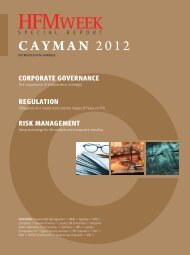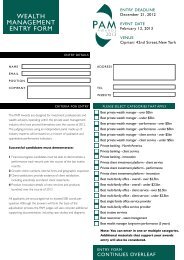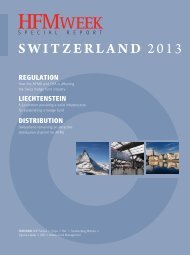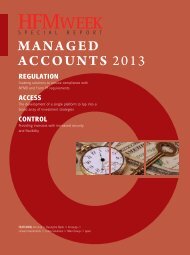US EAST COAST 2012 - HFMWeek
US EAST COAST 2012 - HFMWeek
US EAST COAST 2012 - HFMWeek
You also want an ePaper? Increase the reach of your titles
YUMPU automatically turns print PDFs into web optimized ePapers that Google loves.
<strong>US</strong> EAS T COAS T <strong>2012</strong><br />
JOBS ACT: HOW CAN PRIVATE<br />
FUND MANAGERS RAISE<br />
CAPITAL<br />
DANIEL G. VIOLA, LANCE FRIEDLER AND RON S. GEFFNER OF SADIS AND GOLDBERG LLP GIVE AN OVERVIEW OF HOW THE JOBS ACT WILL IMPACT<br />
PRIVATE FUNDS AND EXPLAIN THE OPPORTUNITIES AVAILABLE TO MANAGERS WITH THE LIFTING OF THE BAN ON HEDGE FUND ADVERTISING<br />
Daniel G. Viola<br />
is a partner and head of<br />
the Regulatory Defense and<br />
Compliance Group. Viola<br />
structures and organises<br />
broker-dealer and investment<br />
advisers and regularly<br />
counsels investment<br />
professionals in connection<br />
with regulatory matters. Viola<br />
previously served as a senior<br />
compliance examiner for<br />
the SEC.<br />
Lance Friedler<br />
is a partner in the Corporate<br />
and Financial Services<br />
Groups. Friedler counsels<br />
clients on structuring and<br />
forming <strong>US</strong> and non-<strong>US</strong><br />
private investment funds,<br />
including the investment<br />
manager and general<br />
partner entities to such<br />
funds.<br />
The Jumpstart Our Business Startups Act<br />
(JOBS Act) may assist private fund managers<br />
with their efforts to raise capital. Most<br />
notably, the JOBS Act eliminates the prohibition<br />
on private fund managers from<br />
publicly advertising and generally soliciting<br />
investors for private funds (such as hedge funds, private<br />
equity funds and venture capital funds). For example,<br />
prior to the JOBS Act, advertising or solicitations through<br />
television, newspapers, radio and publicly available websites<br />
were all precluded. In exchange for the ability to advertise<br />
and generally solicit, private fund managers may<br />
only accept accredited investors into their private funds.<br />
In the majority of circumstances, this is not an issue because<br />
almost all investors in private funds are accredited<br />
investors. In the event that a private<br />
fund accepts non-accredited<br />
investors, the private fund must<br />
provide financial and other disclosures<br />
materially greater than the<br />
disclosure customarily provided in<br />
private funds’ offering documents.<br />
PRIVATE FUND MANAGERS,<br />
PRIOR TO THE JOBS ACT,<br />
WERE ALLOWED TO SELL<br />
THEIR INTERESTS IN THEIR<br />
PRIVATE FUNDS TO AN<br />
UNRESTRICTED NUMBER<br />
OF ACCREDITED INVESTORS<br />
”<br />
RULE 506 AND THE JOBS ACT<br />
Private fund managers, prior to<br />
the JOBS Act, were allowed to<br />
sell their interests in their private<br />
funds to an unrestricted number<br />
of accredited investors, along with<br />
up to 35 non-accredited investors.<br />
However, under the Securities<br />
Act of 1933 (Act), private fund<br />
managers were not permitted to<br />
engage in general solicitation or<br />
advertising on behalf of a private fund. The definition<br />
of an “accredited investor” under the Act is defined as<br />
(1) an individual with income in excess of $200,000 in<br />
each of the two most recent years or joint income with<br />
a spouse in excess of $300,000 in each of those years, or<br />
(2) at least $1m in net worth, excluding the value of a<br />
principal residence.<br />
The prohibition on general solicitation and advertising<br />
prevented private fund managers from marketing to, or soliciting,<br />
investors they did not already know (for example,<br />
a private fund manager needed to have a “substantive preexisting<br />
relationship” with the investor prior to such marketing<br />
or solicitation). A “substantive preexisting relationship”<br />
was generally defined as a relationship whereby the<br />
private fund manager understood the investor’s financial<br />
circumstances and level of sophistication in financial matters<br />
prior to the marketing or solicitation. Merely knowing<br />
that an investor was wealthy or otherwise qualified as<br />
an accredited investor (for example, by reviewing a list of<br />
Fortune 500 CEOs) did not suffice, in the absence of a further<br />
relationship with such investor. The door appears to<br />
be open for private fund managers to use general solicitation<br />
and advertising in marketing private funds with the<br />
passage of the JOBS Act, as long as such private funds only<br />
accept accredited investors.<br />
IMPACT OF THE JOBS ACT ON<br />
PRIVATE FUNDS<br />
With the ban on advertising eliminated,<br />
the degree of impact will<br />
vary based on a private fund manager’s<br />
size. Managers of smaller<br />
funds have been operating their<br />
businesses at a competitive disadvantage<br />
against managers of<br />
larger funds with mature distribution<br />
channels or investor relations<br />
teams. Managers of private funds<br />
of all sizes will be more vocal with<br />
media than in the past. Examples<br />
could include smaller managers<br />
utilising social media and websites,<br />
while larger managers might take<br />
advantage of media opportunities<br />
by giving interviews.<br />
While the JOBS Act will lift restrictions on general advertising<br />
and solicitation, the <strong>US</strong> Securities and Exchange<br />
Commission (SEC) will likely put restrictions on how a<br />
private fund manager may market its private funds. For<br />
example, many in the industry believe that the SEC will<br />
broaden the rules and regulations that apply to marketing<br />
materials of private funds in a manner that is similar to the<br />
restrictions currently applicable to registered investment<br />
companies (for example, mutual funds). For instance, this<br />
may include a pre-filing obligation of marketing materials<br />
with the SEC or a self-regulatory agency. Further, various<br />
24 HFMWEEK.COM











